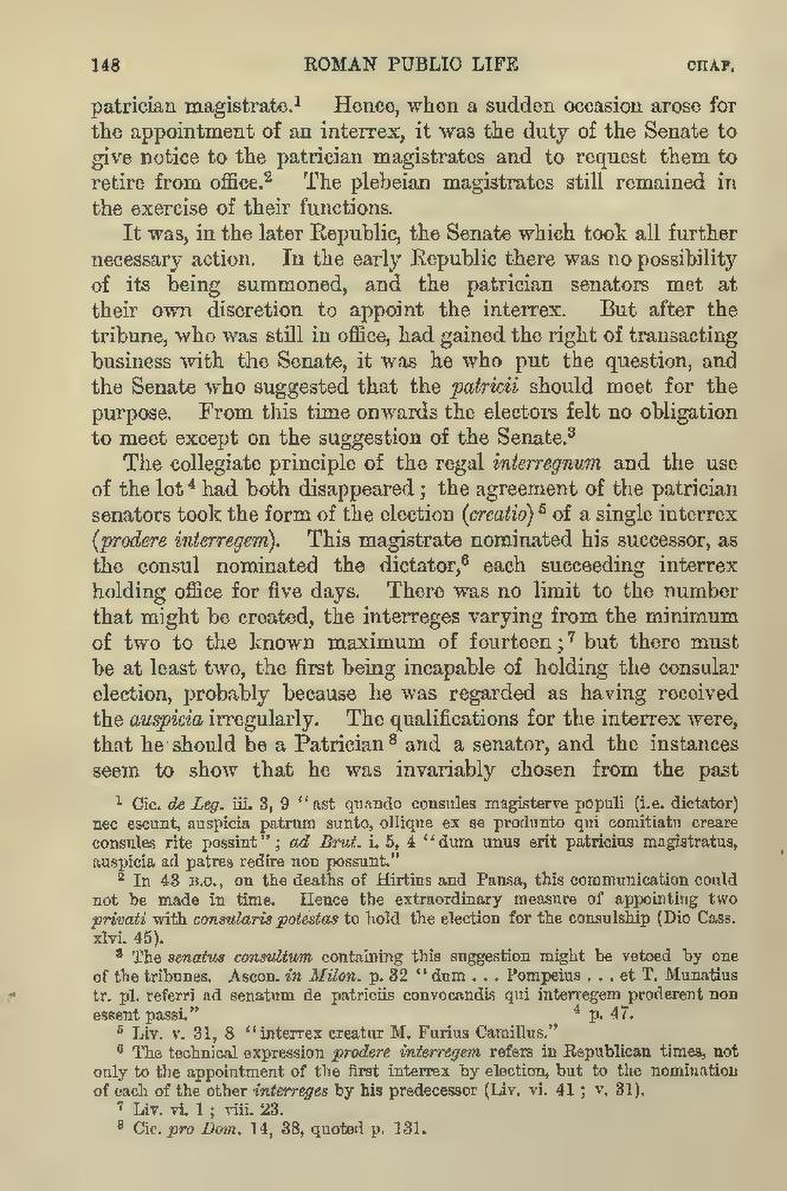patrician magistrate.[1] Hence, when a sudden occasion arose for the appointment of an interrex, it was the duty of the Senate to give notice to the patrician magistrates and to request them to retire from office.[2] The plebeian magistrates still remained in the exercise of their functions.
It was, in the later Republic, the Senate which took all further necessary action. In the early Republic there was no possibility of its being summoned, and the patrician senators met at their own discretion to appoint the interrex. But after the tribune, who was still in office, had gained the right of transacting business with the Senate, it was he who put the question, and the Senate who suggested that the patricii should meet for the purpose. From this time onwards the electors felt no obligation to meet except on the suggestion of the Senate.[3]
The collegiate principle of the regal interregnum and the use of the lot[4] had both disappeared; the agreement of the patrician senators took the form of the election (creatio)[5] of a single interrex (prodere interregem). This magistrate nominated his successor, as the consul nominated the dictator,[6] each succeeding interrex holding office for five days. There was no limit to the number that might be created, the interreges varying from the minimum of two to the known maximum of fourteen;[7] but there must be at least two, the first being incapable of holding the consular election, probably because he was regarded as having received the auspicia irregularly. The qualifications for the interrex were, that he should be a Patrician[8] and a senator, and the instances seem to show that he was invariably chosen from the past
- ↑ Cic. de Leg. iii. 3, 9 "ast quando consoles magisterve populi (i.e. dictator) nec escunt, auspicia patrum sunto, ollique ex se produnto qui comitiatu creare consules rite possint"; ad Brut. i. 5, 4 "dum unus erit patricius magistratus, auspicia ad patres redire non possunt"
- ↑ In 43 B.C., on the deaths of Hirtius and Pansa, this communication could not be made in time. Hence the extraordinary measure of appointing two privati with consularis potestas to hold the election for the consulship (Dio Cass, xlvi. 45).
- ↑ The senatus consultum containing this suggestion might be vetoed by one of the tribunes. Ascon, in Milon. p. 32 "dum . . . Pompeius . . . et T. Munatius tr. pl. referri ad senatum de patriciis convocandis qui interregem proderent non essent passi."
- ↑ p. 47.
- ↑ Liv. v. 31, 8 "interrex creatur M. Furius Camillus."
- ↑ The technical expression prodere interregem refers in Republican times, not only to the appointment of the first interrex by election, but to the nomination of each of the other interreges by his predecessor (Liv. vi. 41; v. 31).
- ↑ Liv. vi. 1; viii. 23.
- ↑ Cic. pro Dom. 14, 38, quoted p. 131.
